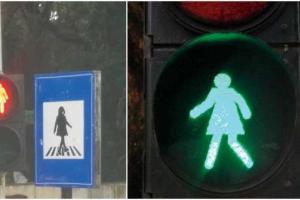"Why do we have a habit of accepting crumbs from the govt instead of asking for genuine efforts and progress?"

It's sad that we continue to accept tokenism from our governments and applaud like trained monkeys at the tiniest gestures. Pic/getty images
 Gender inclusivity, they call it; the idea that people other than men live on this planet, and should be given some attention too, every once in a while. The Brihanmumbai Municipal Corporation decided to do this a while ago, by changing a few traffic signals to represent women. The stick figures were given dresses and, naturally, everyone assumed this would promote equality almost at once.
Gender inclusivity, they call it; the idea that people other than men live on this planet, and should be given some attention too, every once in a while. The Brihanmumbai Municipal Corporation decided to do this a while ago, by changing a few traffic signals to represent women. The stick figures were given dresses and, naturally, everyone assumed this would promote equality almost at once.
Several publications celebrated the move, asking residents for their opinions. One of their comments struck me: "People have started to recognise women's power," was the supposed quote. "It's a good initiative to achieve women empowerment." Now, at the risk of coming across as the perennial Grinch who hates Christmas, I decided to read that resident's statement again and question not just how new traffic signals meant recognition of women's power, but how it empowered women.
ADVERTISEMENT
I understand and accept the symbolic nature of the gesture, of course, and appreciate the fact that little girls may like the idea of figures in dresses for a change. It's not exactly the same as watching brown people play the lead roles in Hollywood movies though, because this act of representation doesn't really do anything other than generate publicity for a short period of time.
The change to traffic signals was initiated a few days before 600,000 Accredited Social Health Activists (ASHA) and Anganwadi workers went on strike. These are women at the frontlines of India's fight against COVID-19; the ones who conducted door-to-door surveys, screened migrant labourers, and repeatedly put themselves at risk for a government that didn't think it important to pay them enough, pay them on time, or give them enough Personal Protective Equipment (PPE) kits.
There are a million things that the BMC can do if it wants to take the empowerment of women seriously. It can start by looking at gender pay gaps in its own ranks, for instance, or gender disparity at the top. It can commission reports about job quality and job satisfaction among its female employees and publish those reports for the rest of us to read. It can examine the thousand departments that come under its purview and look at how men and women are treated by those departments. What it chose to do, instead, is change traffic lights.
To say that India isn't a patriarchal society is as pointless as saying the caste system doesn't exert any power over us. Everyone knows who the disenfranchised among us are, and why they have been kept that way. It's sad that we continue to accept tokenism from our governments though, and applaud like trained monkeys at the tiniest gestures when there are big problems shouting out for attention everywhere we look.
In 2019, a report by the World Bank showed that less than a quarter (23.6 per cent) of women aged 15 and above participated in India's labour force in 2018, compared to 78.6% of men, with rural women leaving the workforce at a faster rate than urban women.
Another report titled 'The Future of Work in India: Inclusion, Growth and Transformation' published by The World Economic Forum and Observer Research Foundation in 2018 said that only 26 per cent of surveyed companies had hired women in the top-five job roles in the preceding five years.
In 2020, India's female population stands at 48.04 per cent compared to 51.96 per cent of its male population. And all we are doing to represent that staggering number of citizens is depicting their likenesses on traffic lights.
It doesn't take a degree in Entire Political Science to figure out that women performed a lot better than men when it came to managing the pandemic this year. From Chancellor Angela Merkel in Germany to Prime Minister Jacinda Ardern in New Zealand and President Tsai Ing-wen in Taiwan, countries managed by women suffered six times fewer confirmed deaths from COVID-19 than countries led by men.
We have to learn from the lessons that 2020 will inadvertently try and teach us, starting with the fact that our established ways of thinking don't always work. We have spent centuries stifling the voices of women and failed to take advantage of the wisdom and resources they have always had at their disposal, simply because we can't stand the idea of an organisation or government that isn't being managed by men. That needs to change.
If the BMC is serious about the empowerment of women, it should put the significant moneyat its disposal where its mouth is. It should give us more than traffic signals.
When he isn't ranting about all things Mumbai, Lindsay Pereira can be almost sweet. He tweets @lindsaypereira
Send your feedback to mailbag@mid-day.com
The views expressed in this column are the individual's and don't represent those of the paper
 Subscribe today by clicking the link and stay updated with the latest news!" Click here!
Subscribe today by clicking the link and stay updated with the latest news!" Click here!







